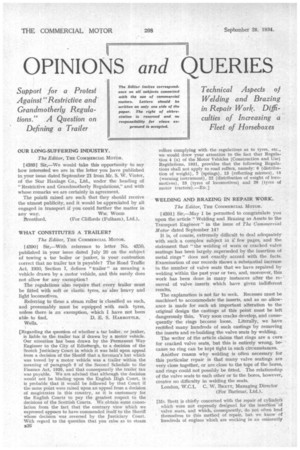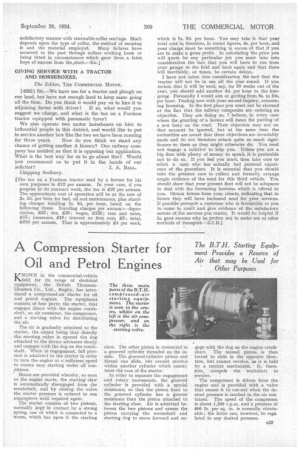OPINIONS and QUERIES
Page 36

Page 37

If you've noticed an error in this article please click here to report it so we can fix it.
[43891 Sir,—We would take this opportunity to say how interested we are in the letter you have published in your issue dated September 21 from Mr. S. W. Vinter, of the Star Haulage Co., Ltd., under the heading of "Restrictive and Grandmotherly Regulations," and with whose remarks we are certainly in agreement.
The points raised are such that they should receive the utmost publicity, and it would be appreciated by all engaged in transport if you could further the matter in any way. Was. Woon Brentford. (For Cliffords (Fulham), Ltd.).
WHAT CONSTITUTES A TRAILER?
The Editor, THE COMMERCIAL MOTOR.
[4390] Sir,—With reference to letter No. 4350, published in your issue dated July 20 on the subject of towing a tar boiler or ju.nker, is your contention correct that no trailer tax is payable? The Road Traffic Act, 1930, Section I, defines " trailer " as meaning a vehicle drawn by a motor vehicle, and this surely does not allow for any exemption? The regulations also require that every trailer must be fitted with soft or elastic tyres, as also heavy and light locomotives.
Referring to these a steam roller is classified as such, and presumably must be equipped with such tyres, unless there is an exemption, which I have not been able to find. D. E. S. HARBOTTLE. Wells.
[Regarding the question of whether a tar boiler, or junker, is liable to the trailer tax if drawn by a motor vehicle. Our attention has been drawn by the Permanent Way Engineer to the City of Edinburgh, to a decision of the Scotch justiciary Court in which it was held upon appeal from a decision of the Sheriff that a foreman's hut which was towed by a motor vehicle was a trailer within the meaning of paragraph 5 of the Second Schedule to the Finance Act, 1920, and that consequently the trailer tax was payable. We are advised that although the decision would not be binding upon the English High Court, it is probable that it would be followed by that Court if the same point were raised upon an appeal from a decision of magistrates in this country, as it is customary for the English Courts to pay the greatest respect to the decisions of the Scottish Courts. We obtain some consolation from the fact that the contrary view which we expressed appears to have commended itself to the Sheriff whose decision was reversed by the Justiciary Court. With regard to the question that you raise as to steam B96
rollers complying with the regulations as to tyres, etc., we would draw your attention to the fact that Regulation 4 (a) of the Motor Vehicles (Construction and Use) Regulations, 1931, provides that the following Regulations shall not apply to road rollers, namely: 6 (distribution of weight), 7 (springs), 13 (reflecting mirrors), 15 (warning instrument), 22 (distribution of weight of locomotives), 23. (tyres of locomotives) and 29 (tyres of motor tractors).—En.]
WELDING AND BRAZING IN REPAIR WORK.
The Editor, THE COMMERCIAL MOTOR.
[4391] Sir,—May I be permitted to congratulate you upon the article "Welding arid Brazing as Assets to the Transport Engineer" in the issue of The Commercial Motor dated September 14?
It is, of course, extremely difficult to deal adequately with such a complex subject in few pages, and the statement that "the welding of worn or cracked valve seatings has been largely superseded by the insertion of metal rings" does not exactly accord with the facts. Examination of our records shows a substantial increase in the number of valve seats that we have repaired by welding within the past year or two, and, moreover, this work has been done in many instances after the removal of valve inserts which have given indifferent results.
The explanation is not far to seek. Recesses must be machined to accommodate the inserts, and as no allowance is made for such an important alteration to the original design the castings at this point must be left dangerously thin. Very soon cracks develop, and consequently the rings become loose. Literally, we have rectified many hundreds of such castings by removing the inserts and re-building the valve seats by welding.
The writer of the article claims that rings are a cure for cracked valve seats, but this is entirely wrong, because no ring can be kept tight in such circumstances.
AnOther reason why welding is often necessary for this particular repair is that many valve seatings are very close together, or are close to the tops of the bores, and rings could not possibly be fitted. The relationship of the valve seats to each other or to the bores, however, creates no difficulty in welding the seats.
London, W.C.1. C. W. 13aETT, Managing Director (For Barimar, Ltd.).
[Mr. Brett is chiefly concerned with the repair of cylinder 'S which were not expressly designed for the insertion Of valve seats, and which, consequently, do not often lend • themselves to this method of repair, but we know of hundreds of engines which are working in an eminently satisfactory manner with renewable-collar seatings. Much depends upon the type of collar, the method of securing it and the material employed. Many failures have occurred in the past through collars working loose or being fitted in circumstances which gave them a faint hope of success from the.start.—En.) GIVING SERVICE WITH A TRACTOR AND HORSEBOXES.
The Editor, THE COMMERCIAL MOTOR.
[43921 Sir,—We have use.for a tractor and plough on our land, but have not enough land to keep same going all the time. Do you think it would pay us to hire it to adjoining farms with driver? If so, what would you suggest we charge, and what is the tax on a Fordson tractor equipped with pneumatic tyres?
We also operate two motor horseboxes on hire to influential people in this district, and would like to put in service another box like the two we have been running for three years. Now do you think we stand any chance of getting another A licence? One railway company has notified us that it is opposing Our application. What is the best way for us to go about this? Would you recommend us to put it in the hands of our
solicitor? I. A. BALL, Chipping Sodbury.
[The tax on a Fordson tractor used by a farmer for his own purposes is per annum. In your case, if you propose to do contract work, the tax is £25 per annum. The approximate cost of operation will be at the rate of 2s. 3d. per hour for fuel, oil and maintenance, plus standing charges totalling is. 8d. per hour, based on the following items. Standing charges per annum :—depreelation, £25; tax, £25; wages, £125; rent and rates, £15; insurance, ; interest on first cost £5; total, £210 per annum. That is approximately per week, which is is. 8d, per hour. You may take it that your total cost is, therefore, in round figures, 4s. per hour, and your charge must be something in excess of that if you are to make a gross profit. In calculating the price you will quote for any particular job you must take into consideration the fact that you will have to run from your garage to the field and back again and that there will inevitably, at times, be certain delays.
I have not taken into consideration the tact that the tractor will not be in use all the year round. If you reckon that it will be used, say, for 30 weeks out of the year, you should add another 4d. per hour to the fore, , going. Personally I would aim at getting from Ss. to 10s. per hour. Dealing now with your second inquiry, concerns ing licensing. In the first place you must not be alarmed at the fact that the railway companies are entering an objectibn. They are doing so, T. believe, in every case where the granting of a licence will mean the putting of a new lorry on the road. Their objection may not on that account be ignored, but at the same time the authorities are aware that these objections are invariably made and do not therefore attach quite so much significance to them as they might otherwise do. You need not engage a solicitor to help you. Unless you are a big firm with plenty of money to spend, it is preferable not to do so. If you feel you must, then take care to select a man who has actually had personal experience of the procedure. It is essential that you should take the greatest care to collect and formally arrange ample evidence of the need for this third vehicle. You should show that your present fleet will not be adequate to deal with the increasing business which is offered to you. Obtain letters from your clients, indicating that in future they will have increased need for your services. If possible persuade a customer who is favourable to you to come to cotirt and give evidence of the satisfactory nature of the services you render, It would he helpful if he gave reasons why he prefers not to make use of other methods of transport.—S.T.R.)




















































































